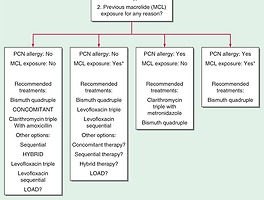헬리코박터 파일로러 검사와 치료의 적응증은 무엇입니까?
What Are the Indications for H. pylori Testing and Treatment?
헬리코박터에 대한 검사는 특정한 환자에서 이행되며, 헬리코박터 파일로리 양성인 모든 환자는 치료 받아야 합니다.
Testing for H. pylori is indicated in certain patients. Any patient who tests positive for H. pylori infection should be treated.
활동성 또는 이전 소화성 궤양 병력의 모든 환자들은 완치되었다는 것이 증며되지 않는 한 헬리코박터 감염에 대한 검사를 받아야 합니다. Low-grade gastric mucosa–associated lymphoid tissue lymphoma 또는 조기 위암의 내시경적 절제 병력 환자도 검사 받아야 합니다.
All patients with active or previous peptic ulcer disease should be tested for H. pylori infection unless there is documentation that the infection was previously cured. Patients with low-grade gastric mucosa–associated lymphoid tissue lymphoma or a history of endoscopic resection of early gastric cancer should also be tested. Testing in patients with gastroesophageal reflux disease is not recommended unless the patient has a history of peptic ulcer disease or dyspepsia. If a patient with gastroesophageal reflux disease is tested and found to have H. pylori infection, treatment should be offered with the acknowledgment that symptoms of gastroesophageal reflux disease are unlikely to improve.
근거가 충분하지 않지만 ACG는 또한 장기 진통소염제 약물 치료를 시작하는 사람, 원인이 없는 철 결핍성 빈혈, 성인 ITP 환자에서 헬리코박터 검사를 권고합니다.
Based on low-quality evidence, the ACG also recommends testing for those initiating long-term nonsteroidal anti-inflammatory drug therapy, those with unexplained iron deficiency anemia, and adults with idiopathic thrombocytopenic purpura.
이상적으로 활동성 감염을 확인하기 위한 검사가 감염 진단에서 사용되어야 합니다. UBT, fecal antigen test, 내시경적 조직검사입니다.
Ideally, tests that identify active infection, such as a urea breath test, fecal antigen test, or endoscopic biopsy, should be used in the diagnosis of H. pylori infection. However, because the pretest probability of infection is higher in patients with documented peptic ulcer disease, immunoglobulin G antibody testing is acceptable in these patients. Nonendoscopic testing is an option in patients younger than 60 years with uninvestigated dyspepsia without red flags. If endoscopy is used in patients with dyspepsia, gastric biopsies should be performed.
위암 가족력이 있는 무증상 환자, lymphocytic gastritis, hyperplastic gastric polyps, hyperemesis gravidarum 환자에서 검사와 치료를 권고할만한 증거는 충분하지 않습니다.
There is insufficient evidence to make a recommendation about testing and treatment in asymptomatic patients with a family history of gastric cancer or in patients with lymphocytic gastritis, hyperplastic gastric polyps, or hyperemesis gravid
1. Am Fam Physician. 2018 Jan 15;97(2):135-137.
2. Am J Gastroenterol 2017; 112:212–238; doi: 10.1038/ajg.2016.563 ; published online 10 January 2017
'소화기내과(위장관) > 소화성궤양' 카테고리의 다른 글
| H. pylori 감염을 치료할 때 성공적인 제균을 예견하는 요인은 무엇입니까? 2017 ACG clinical guideline (0) | 2018.08.30 |
|---|---|
| 증거 기반 1차 치료 전략은 무엇입니까? 2017 ACG clinical guideline (0) | 2018.08.21 |
| 진통소염제 관련 위점막 손상에 대한 치료, 예방에 대한 내용 Harrison's 20th edition (0) | 2018.08.18 |
| H. pylori infection 환자에서 항생제 선택 (0) | 2018.08.18 |
| 프로톤 펌프 억제 경구제, Omeprazole, Lansoprazole, Pantoprazole, Rabeprazole (심사기준) (0) | 2018.04.17 |




